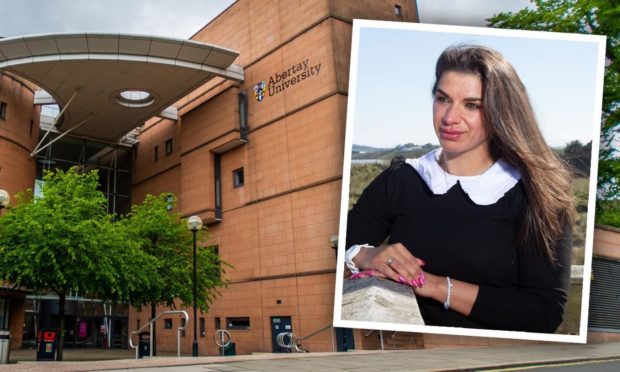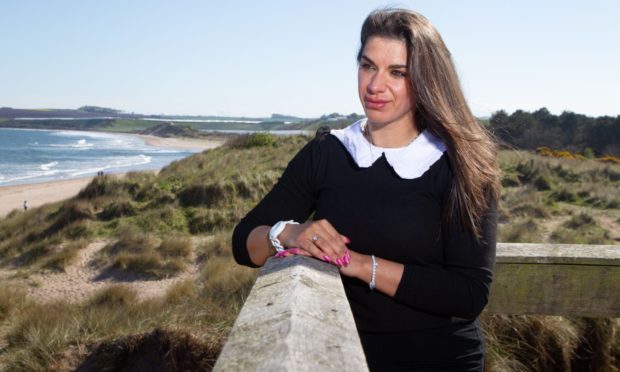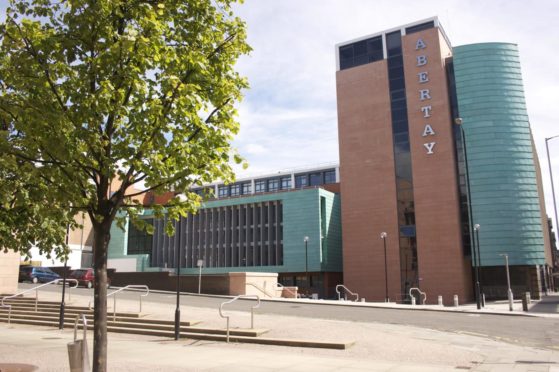Classmates of an Abertay University student being investigated over “offensive” and “discriminatory” comments she made during lectures, prompting a free speech row, say they have been abused online.
Students complained about comments made by fellow Dundee law student Lisa Keogh which prompted a misconduct investigation and a row involving Abertay University over the right to free speech.
Now, they say they are facing severe harassment and being dubbed “snowflakes.”
Ms Keogh, 29, is facing an investigation by university bosses after she claims she was reported for saying women were born with vaginas and “the difference in physical strength of men versus women is a fact”.
Ms Keogh student said she was “utilising her right to free speech”.
Abertay University has defended its position on free speech, saying students are free to express their views in a tolerant and legal way.
Severe backlash
Now, students say they have been subjected to online abuse and say their complaint was not based on those comments alone.
A group statement from students taking the gender, sexuality and law module said the complaint was made after “the cumulation of many instances” which were interpreted by the majority of the class to be hostile and aggressive.
False narrative
The statement said: “This false narrative has caused severe stress and anxiety to many students in their final week of term who are finishing off final exams and dissertations.
“This is due to being attacked online and branded as ‘snowflakes’ who can’t handle differing opinions in debate and we wish to clarify this point.
“There was not one shared opinion of the class, rather we were able to put our views forward in a topical and respectful manner, with the expectation others would do the same.”
Complaint
The students said Ms Keogh’s account of the incident implies the reason there had been a complaint made about her stating what she perceived to be ‘biological facts’ during a class debate.
They also accused her of “transphobic comments”
The statement added: “While comments of this nature did occur, the fact that these were at the heart and the full extent of the complaint is not the case.
“Had any of the class chosen to freely give our opinion on this matter whilst it was being discussed in a respectful manner, it would have been welcomed and would certainly not be the catalyst to prompt an investigation.
“The complaint from the class did not come about from instances of transphobia in isolation, rather were due to a pattern of off-topic, harmful contributions, occurring over a period of several weeks.”
They also refuted an allegation that Lisa had been muted during the debate, adding: “Our lecturer didn’t at any point single out any one student to hinder them from contributing.”
Duty to investigate
A statement from Abertay University said an isolated comment saying “women have vaginas” would not prompt a misconduct investigation.
It read: “Under normal circumstances, the university does not comment on student disciplinary cases, however it has once again become necessary to correct inaccurate claims.
“To be clear, all Abertay students are free to express their views on campus, as long as this is not done in an intolerant or abusive way which would breach our code of student discipline.
To be clear, all Abertay students are free to express their views on campus, as long as this is not done in an intolerant or abusive way which would breach our Code of Student Discipline. 2/8
— Abertay University (@AbertayUni) May 21, 2021
“Press and social media commentary has centred on gender issues and statements such as “women have vaginas” and “men have penises” which are lawful statements and would categorically not lead to any university misconduct investigation, if expressed on campus in a reasonable manner.
“Our code of student discipline does not police freedom of speech or the nature of views put forward during classroom discussion or debate.
“It exists to provide a framework within which disruptive, aggressive or abusive behaviour that makes fair and robust debate or classroom learning impossible can be identified and stopped.
“We believe that all universities should uphold freedom of speech within the law. We are proud that Abertay is a place where difficult and controversial debate can take place within an academic environment.
“Scottish universities are required by law to investigate all complaints, whether by students, staff or members of the public.
“We are deeply saddened by the online abuse that has been aimed at our students and staff members.”
‘Never felt stifled’
The students who made the complaint agreed that all complaints should be investigated.
They added: “In our four years of university, through countless debates across a variety of modules, we have never felt as though our freedom of expression has been stifled.
“On the contrary, the university has always supported lecturers and students in having open and honest discussion on a variety of subjects which are contentious in society.”
In response to the statement from the students, Lisa said: “It is disappointing that those who made the initial complaint seems to be changing tack this late in the day.
“The allegations directly put to me by the University in April as part of the formal investigation related almost exclusively to what I said, not the manner in which I said it.
“For instance, I was challenged about my answer to the question ‘How would you define a woman?”, to which I replied, ‘Someone with female reproductive organs’.
“Just once, I was asked during the investigation about my tone during a class discussion on sexual assault, in which the lecturer repeatedly said ‘All men are rapists’.
“As a mother of two young boys, that’s a point of view I passionately disagree with. The discussion that followed did become quite heated. But the other participants in that debate were equally worked up, so why should I be singled out?
“The truth is, it was my views that the other students objected too, not the way I expressed them and this born out by the questions put to me as part of the disciplinary process.”


